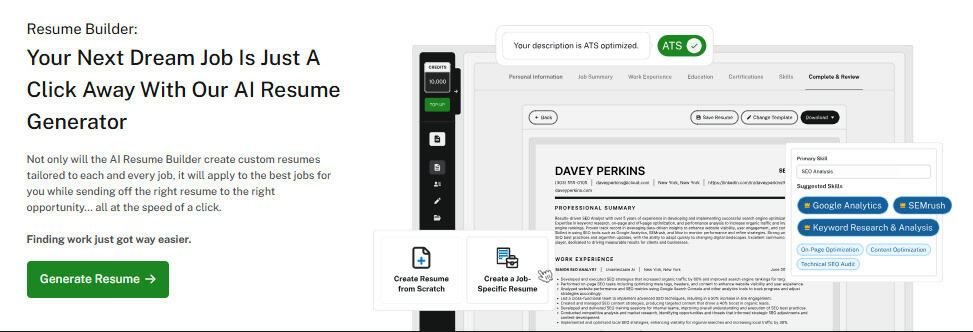Do you love talking to people? Do you love managing people? Do you like the sound of clearing targets one day, meeting clients the next and running interviews the day after?
If yes, then a job in recruitment could be perfect for you.
The following article examines recruiting roles as well as essential abilities required for career growth amongst recruitment professionals.
What Does a Recruiter Do?
Recruiting professionals actively identify suitable applicants who can fill open job vacancies.
They work directly with organizations to analyze job requirements while searching for suitable candidates who go through selection processes.
Other responsibilities of a recruiter include:


Never Worry About AI Detecting Your Texts Again. Undetectable AI Can Help You:
- Make your AI assisted writing appear human-like.
- Bypass all major AI detection tools with just one click.
- Use AI safely and confidently in school and work.
- Meeting with employers to discuss candidate specifications
- Liaising with candidates to understand their work background, skills, experience and career goals
- Sourcing candidates for roles online or contacting registered candidates
- Attending job fairs at universities and career events
- Interviewing candidates for employers
- Negotiating employment contracts with employers
- Processing paperwork and onboarding new employees
- Helps new hires through their onboarding phase for a seamless transition into the organization.
- Stays updated about labor industry trends, employee salary benchmarks and work-related legal frameworks to make reasonable hiring choices.
- Engages in employer branding initiatives to create an attractive image that appeals to potential job candidates.
Every recruitment job has its distinct qualities since the actual responsibilities depend on the unique features of the position.
An internal recruiter would execute their duties differently from a recruiter based at an agency who manages several clients.
Types of Recruiters

Here are some types of recruiters:
In-house Recruiters
These are recruiters who are the typical traditional full-time employees who work internally at a business.
They are responsible for acquiring talent for their organization and executing the complete staffing process for their company from start to finish.
The recruitment specialist handles every aspect of the hiring procedure from post-advertisement work to candidate communication.
This entails active management of job postings while finding suitable candidates and arranging interview time slots for qualified candidates.
Headhunters
These recruiters known as external recruiters specialize in locating personnel who hold exceptional professional abilities.
They focus on highly skilled individuals for leadership or C-suite roles.
For you to be an excellent headhunter, you need to have exemplary networking skills as you need to maintain a vast professional network to constantly tap into talent leadership candidates.
Staffing Agency
They are widely known as a recruitment agency and are the most common type of outsourced recruiting.
They work for different types of organizations, from the tech industry to the healthcare industry.
These agencies are important because they offer benefits such as flexibility, cost savings and diverse talent.
Say you want to know how to become a nurse recruiter agency, you must start managing a substantial number of recruiters who work as subordinates to you while maintaining an extensive database of candidates.
This is also the same for how to become a healthcare recruiter.
However, it’s important to know that agencies didn’t start as agencies; The history of agencies as employment centers began with recruiters who collaborated with other recruiters before establishing their first centralized employment database.
Technical Recruiters
These recruiters dedicate their practice to the technological domain by sourcing professionals who work in IT and engineering as well as other technical domains.
Your journey on how to become a technical recruiter should begin with proficiency in technical skills while developing abilities to work with hiring managers to confirm that candidates meet job specifications.
Contract Recruiters
Temporary recruiters manage recruitment needs for organizations under two circumstances: when the organization needs to hire increased numbers of employees or when the permanent recruiting staff requires leave.
They operate like in-house recruiters, but only for a temporary period.
Ready to launch a lucrative career in recruitment? Here are tips to help you succeed as a recruiter:
Step 1: Understand the Skills Required

As a recruiter, here are some skills you should have:
- Communication Skills: This skill will come up in your ability to write compelling job postings to attract top talents and to explain the job description and company culture to candidates. You will also need to ask candidates insightful questions and give feedback to both candidates and hiring managers.
- Sourcing Skills: This skill is important because you need to be able to identify the best talents by using job boards, professional networks or social media platforms. Establishing and understanding candidate personas through the identification of the perfect candidate profile with experience and abilities and driving elements will guide your candidate sourcing approach.
- Negotiation Skills: Your ability to negotiate effectively will help you secure a suitable compensation package between what suits your organization and the prospective employee. Your responsibility must extend to responding to relevant questions that the applicant raises regarding the position. If you are an external recruiter, you will need to negotiate your fees with each company you work with.
Technical Skills
Some of the technical and hard skills a recruiter should have include:
- The ability to use an Applicant Tracking System (ATS) to manage applicants and schedule interviews
- The ability to use social media to build employer branding and source candidates
- The ability to use video conferencing tools and platforms to conduct remote interviews
- The ability to use job boards like LinkedIn to post job openings.
You can acquire all these skills through hands-on experience, training programs, workshops and online HR courses.
Step 2: Education and Experience
Recruiter positions do not require specific qualifications, although strong A-level and GCSE results showcase essential competencies, including communication ability and numerical understanding.
Degrees
You can choose to embark on an undergraduate degree like Law, philosophy, Mass Communications or Psychology before starting out in the recruitment industry, but it’s usually not mandatory.
The recruitment industry is one that rewards good results, so experience and skills are necessary for the role.
Certifications to Stand Out
Even if you don’t hold a bachelor’s degree, you can become a certified recruiter through some of these programs:
- Talent Acquisition Specialty Credential – SHRM: The SHRM Talent Acquisition Specialty Credential program provides exhaustive SHRM eLearning courses that address Global Hiring as well as Diversity, Equity & Inclusion (DE&I) in the Talent Acquisition Space and the Virtual Talent Acquisition Lifecycle.
You also get a bonus course about recruiting in cybersecurity, which is currently an in-demand field.
This certificate is good for individuals who are interested in gaining knowledge, proficiency, and a recognized credential in talent acquisition.
- Recruiter Certifications – Association of International Recruiters (AIRS): The certification program delivers expertise to established human resources specialists as well as beginners entering the field of recruitment specialization. This certificate is valid for two years, and there’s an option to recertify for free every two years.
- Certified People Sourcing Professional (CPSP) – Sourcing Certifications: This certificate proves that the holder has been armed with the right sourcing skills to become a successful professional in the field of talent acquisition.
To get certified, participants must pass the CPSP exam, which requires that they demonstrate proficiency in the following six core skill groups, including exploratory research, Google search, X-ray search, cross-referencing information, using LinkedIn and social search.
- Certified Personnel Consultant (CPC) – National Association of Personnel Services (NAPS): The National Association of Personnel Services provides certification for this academic field. To obtain the certification, you must prove your expertise in employment laws and legal aspects surrounding direct-hire and temporary staffing professional responsibilities.
- Freelance Tech Recruiter – Tech Recruitment Academy: This certification is meant for IT recruiters who want to boost their recruiting abilities and become business partners to IT hiring managers and clients. Once you finish the course, you get your certificate and can feature it on your LinkedIn profile, boosting your credibility.
Step 3: Get Experience
Increasing your professional experience remains essential if you wish to progress in the recruitment industry.
To start your path, you need to begin by working at an internship position at a staffing agency or HR department so you can grasp hiring process basics.
When applying for these positions, leverage the AI Smart Applier from Undetectable AI as it helps with applications.
This tool streamlines the monotonous application process and allows you to apply for several roles efficiently.
Unlike basic automation tools, it tailors your application to each job role, increasing your chances of getting past the initial screening filters and landing a job.

On the other hand, the Resume Builder generates customized resumes.
The tool strategically incorporates relevant keywords from job descriptions while maintaining readability and flow.
It can highlight your specific recruiting skills and achievements in a way that demonstrates your value to potential employers.
Since it produces human-like content that bypasses AI detection, your resume won’t be filtered out by increasingly common AI screening tools.

Undetectable AI also features the Cover Letter Generator that produces attention-grabbing introductions when seeking these jobs.
It goes beyond generic templates by creating customized cover letters that address the particular needs of each role you’re applying for.

The combination of these tools will boost your interview prospects by developing customized job materials that make you more memorable to hiring managers.
Start exploring—our AI Detector and Humanizer are waiting in the widget below!
With No Experience?
Even with no experience in the recruitment industry, you can still break into the industry through several ways.
One important way will be through your transferable skills. For example, sales experience transfers well to recruitment, particularly the skills of persuasion and relationship building.
Additionally, customer service backgrounds help develop the people skills essential for successful recruiting.
Entry-Level Job Titles to Look For
Below are some of the entry-level job titles to look for:
- Recruitment Coordinator: Recruitment Coordinators lend assistance to senior recruiters by managing candidate communications and performing administrative work duties.
- Talent Acquisition Assistant: As a Talent Acquisition Assistant, you will get exposure to the complete recruitment cycle with assistance from knowledgeable mentors.
- HR Assistant: The HR assistant performs recruitment tasks while building skills in human resource management responsibilities.
- Sourcing Specialist: As a sourcing specialist, you have the exclusive responsibility of attracting and selecting potential candidates for the workforce.
- Recruiting Researcher: A recruiting researcher needs to conduct talent pool identification, followed by developing candidate pipelines for upcoming requirements.
Step 4: Learn the Tools of the Trade
Knowledge of regular recruiting technologies creates a path to excellent recruiting success.
The recruitment process heavily depends on several Applicant Tracking Systems (ATS) such as Greenhouse along with Qureos, Lever, Workday, Taleo, and iCIMS. CRM Systems including Bullhorn, Avature and Beamery assist companies in managing relationships with their candidates over time.
Your candidate search speed becomes quicker through sourcing tools such as LinkedIn Recruiter, SeekOut and Hiretual.
Standardized candidate evaluation comes from Assessment Platforms that include HackerRank and Codility together with TestGorilla.
Video Interview Software through HireVue, Spark Hire and Zoom has gained substantial importance as recruitment software for remote hiring operations.
Many of these platforms offer free trials or certification programs, providing opportunities to build technical skills and add credentials to your resume. You can also explore free recruitment software to practice using real-world tools and gain hands-on experience.
Step 5: Build Your Professional Brand
Once you have learnt the tools of the trade, the next thing is to build your professional brand.
You can do this by optimizing your LinkedIn profile with recruitment-specific keywords, achievement highlights, and regular engagement with industry content demonstrates your professional commitment.
In addition, networking consistently through HR and recruitment events and joining professional organizations like SHRM or local recruiting groups builds your professional community.
Finally, following industry leaders helps you stay informed about recruitment trends and best practices, ensuring your methods remain current and effective.
Step 6: Apply for Jobs and Network
The job search process for recruiters should exemplify the very skills you’ll use professionally, demonstrating your recruitment expertise through your own application approach.
Target companies strategically by researching organizations with positive work cultures and growth opportunities that align with your values and career goals.
Tailor your resume along with your cover letter for every job application by emphasizing skills and experiences that match the requirements of targeted recruiting positions.
Create recruitment-oriented stories that demonstrate your talent by showing how you approached successful placements together with past role achievements.
The key to professional growth involves regularly attending recruitment conferences alongside HR meetups to expand your network and discover unposted job opportunities in the field.
Final Thoughts
A successful recruiter develops their skills through constant learning sessions and develops stable professional relationships.
Undetectable AI currently provides its powerful tools that you can use for your job search once you decide to grow your recruitment career.
Visit us today to transform your job search and take the next step toward your recruiting career.
